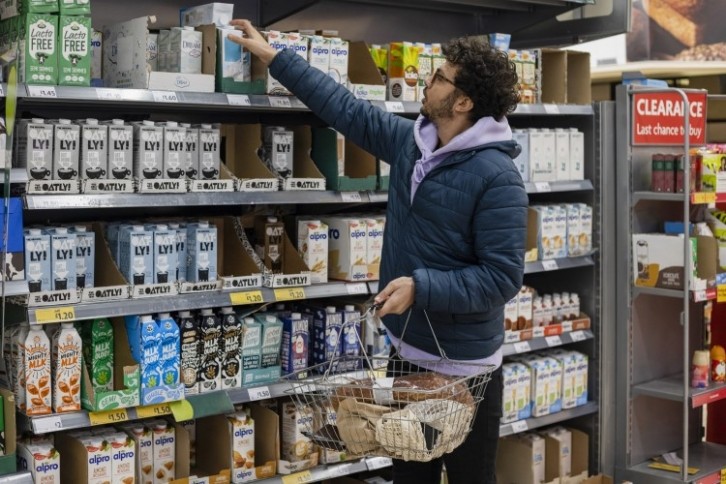Convenience in choice: Oatly aims to entice flexitarians to stick to oatmilk with new releases

The 1L, long-life releases expand Oatly’s ambient portfolio and are identical in taste to the already-available Oatly Whole, Semi, Light and No Sugars versions for cold storage. The releases are hoped to enable greater choice for consumers who are shopping for dairy alternatives, says the company.
The three products are launching in the UK, the Nordics, DACH and the Benelux regions.
“For the first time, people can purchase Oatly Light, Oatly Semi, and Oatly Whole in both chilled and long-life formats,” said Bryan Carroll, general manager at Oatly UK&Ireland. “In addition, the products contain a new upgraded recipe from our Original Ambient oat drink with better functionality for all purposes, including in hot drinks.”
The new products have been formulated with a new recipe based on The Original drink, though the Whole version contains a higher fat content of 2.8g compared to 1.5g for Semi and No Sugars. All three beverages contain 10% oats as well as vitamins (D2, B12, B2), minerals (calcium carbonate and potassium iodide), water, salt, rapeseed oil, as well as dipotassium phosphate (an acidity regulator also present in the Barista edition).
Asked how Oatly Whole differs from Barista – the creamiest beverage the company offers, with 3g of fat – Carroll suggested it was about giving the consumer more choice. “Some of our customers love the creaminess of Barista for their morning coffee, and others are looking for a lighter, milder option for their cereal,” he said. “Our mission is to make dairy alternatives more accessible, and that includes mirroring the choices shoppers are used to with dairy, without having to compromise on taste, performance or nutrition.”
Asked about No Sugars – which is also available in chilled and ambient formats – Carroll said it was ‘a brand new product’ that was ‘uniquely developed for a milder, less sweet flavor’. “It has a lower sugar content and a small reduction in calories,” he said; the calories here are 44kcal per 100ml, compared to 61kcal in the Barista edition. “In our other drinks, we typically break down more of the carbs from oats during the production process for a naturally sweeter taste. With “No” Sugars, we leave it up to your digestive system,” he added.
As for the new recipe, Carroll added: “The products contain new and improved recipes so not only do they taste great, but they perform equally as well in hot drinks, cooking, baking as they do atop your morning cereal.”
Boosting availability and choice
Ahead of launching the three new products in the UK on May 29, 2023, Oatly released consumer research data that highlighted why consumers who had chosen to switch to plant-based drinks failed to stick to it.
The survey, which polled more than 2,000 UK adults, was carried out online by Research Without Barriers between April 26-28, 2023 and revealed that a third (37%) of Brits had tried to give up dairy in the last three years, but two thirds (70%) admitted they had failed.
The reasons were less to do with taste, and more to do with convenience. “As well as familiarity and convenience, the top reasons for consumers returning to dairy included the availability of dairy (30%), falling back into it by accident because it is in everything (23%), and the hassle of trying to eliminate it (20%),” explained Carroll.
The company’s UK&Ireland general manager added that health is still a top priority for shoppers. Citing data from an independent McKinsey study carried out on behalf of Oatly in 2021, Carroll said 32% of consumers enter the category in order to lead ‘a healthier lifestyle’ while according to Mintel, over 57% of consumers are taking steps to limit or reduce the amount of sugar in their diet.
Slow demand for alternatives?
Oatly’s new beverage releases are hitting the shelves at a time when demand for meat and dairy alternatives is slowing. In May, Oatly told The Observer it was pulling out of the plant-based ice cream market and is withdrawing its 500ml, £4.50 tubs from retail. Meanwhile, Innocent Drinks pulled its chilled plant-based range in March, and Nestlé discontinued its Garden Gourmet range of meat alternatives.
While cow’s milk purchases have continued to decline, milk remains a shopping essential in the UK. According to Kantar, in the year to February 2023, 98% of UK households purchased cow's milk more than once a week on average, with semi-skimmed milk accounting for 62% of liquid milk volumes. Year on year however, milk volumes declined by 6.1% while spend increased by 19.2%, with the average price of milk up 16 pence ($0.20).
Meanwhile, plant-based milk sales grew by 17% between 2020-2022, and even though inflation has had less of an impact on plant-based milk pricing (with costs raising by 6% vs 21% for conventional milk), alternatives have remained more expensive than cow’s milk. Demand for alternatives has softened in the last 12 months, with a volume decline between January and October 2022 but growth of 6.1% thereafter. In comparison, plant-based milk sales grew by 17% in 2021. Nevertheless, the UK market is the fourth largest in Europe based on plant-based milk sales value while plant-based milk had a 7% share of the total UK milk market, according to NielsenIQ data analyzed by The Good Food Institute Europe.
Oatly is set to open its first UK-based factory this year, and has plans to launch a soft-serve ice cream.















